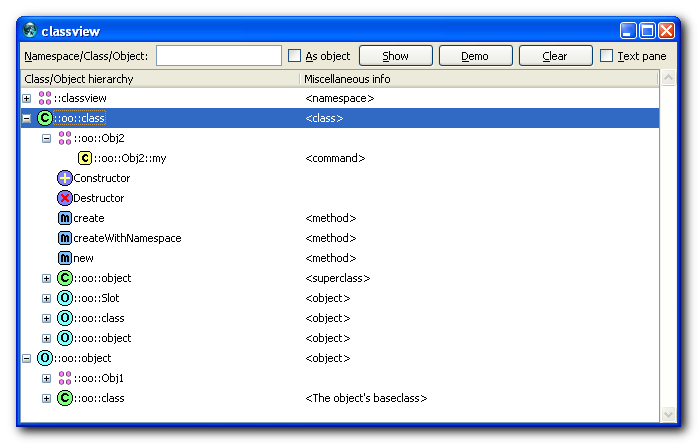Tcl's wonderful
introspection capabilities extend to
TclOO through a profusion of
info object and
info class subcommands. Yummy! But so many subcommands are a bit tricky to digest .. here's a tool
aspect made to assist looking inside:
proc inspect {obj} {
set obj [uplevel 1 [list namespace which -command $obj]]
set isa [lmap type {object class metaclass} {
if {![info object isa $type $obj]} continue
set type
}]
if {"class" in $isa} {
lappend info {class superclasses} {class mixins} {class filters}
lappend info {class methods} {class methods}
lappend info {class variables} {class variables}
}
if {"object" in $isa} {
lappend info {object class} {object mixins} {object filters}
lappend info {object methods} {object methods}
lappend info {object variables} {object variables}
lappend info {object namespace} {object vars} ;#{object commands}
}
set result [dict create isa $isa]
foreach args $info {
dict set result $args [info {*}$args $obj]
foreach opt {-private -all} {
catch {
dict set result [list {*}$args $opt] [info {*}$args $obj $opt]
}
}
}
dict filter $result value {?*}
}
proc pdict {d args} { ;# analogous to parray
set maxl [::tcl::mathfunc::max {*}[map {string length} [dict keys $d]]]
dict for {key value} $d {
puts stdout [format "%-*s = %s" $maxl $key $value]
}
}
#extend ::oo::InfoClass {
# proc commands {o args} {
# map {::namespace tail} [info commands [info object namespace $o]::*]
# }
#}If you have
ensemble extend, the
info object commands extension might be useful.
Here's what it has to say about our two favourite objects:
% pdict [inspect oo::object]
isa = object class
class methods = destroy
class methods -private = unknown eval varname variable destroy <cloned>
class methods -all = destroy
object class = ::oo::class
object methods -all = create destroy new
object namespace = ::oo::Obj1
object commands = my
object commands -private = my
object commands -all = my
% pdict [inspect oo::class]
isa = object class metaclass
class superclasses = ::oo::object
class methods = create new
class methods -private = create createWithNamespace new
class methods -all = create destroy new
object class = ::oo::class
object methods -all = create destroy
object namespace = ::oo::Obj2
object commands = my
object commands -private = my
object commands -all = my
aspect has dreams of this one day growing into a
Smalltalk-esque
[Object Browser
], but this is pretty good from a command line.
EMJ 2016-03-17: and which "map" function are you using here?
2018-05-18: suggested replacement:
set maxl [::tcl::mathfunc::max {*}[lmap key [dict keys $d] {string length $key}]]Eugene 2016 Apr 14: Just stumbled upon this page today. As I've been working for a while on some kind of Object Browser GUI, I thought it would be nice to share. So,
here
's the link to the project page at ChiselApp, and here's a screenshot:
 chw
chw 2016-07-04: Eugene, this is very nice and ingeniously handy! Thank you. Couldn't resist to build it into
AndroWish and
undroidwish.
See Also
Tclook
 's the link to the project page at ChiselApp, and here's a screenshot:
's the link to the project page at ChiselApp, and here's a screenshot: chw 2016-07-04: Eugene, this is very nice and ingeniously handy! Thank you. Couldn't resist to build it into AndroWish and undroidwish.
chw 2016-07-04: Eugene, this is very nice and ingeniously handy! Thank you. Couldn't resist to build it into AndroWish and undroidwish.


